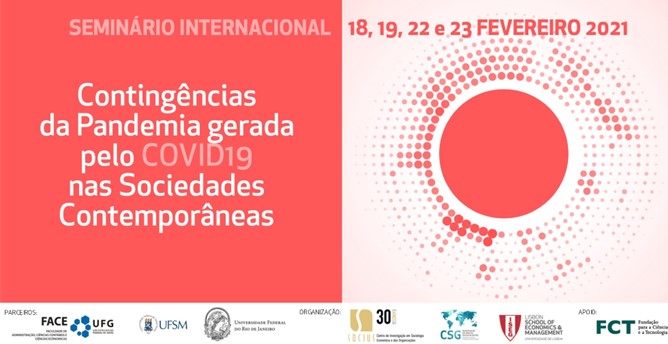
Presentation in the International Seminar “Pandemic contingencies generated by Covid-19 in Contemporary Societies”
On the 22th February, CRiCity researchers Eunice Castro Seixas, Maria Fernandes-Jesus, Paulo Castro Seixas and Sara Gonzalez have presented the preliminary findings of their study on the subjective experiences of children during the first lockdown in Portugal, in 2020, and the subsequent post-lockdown period in the International Seminar “Contingências da Pandemia gerada pelo Covid-19 nas Sociedades Contemporâneas”/”Pandemic contingencies generated by Covid-19 in Contemporary Societies”, held online and organized by SOCIUS/CSG-ISEG in partnership with three Universities in Brasil (FACE/UFG; UFSM and UFRJ).

The preliminary conclusions of the study 'Reports of children's confinement and de-confinement', carried out by CRiCity between May and July 2020 with children from 6 to 12 years old, through an online survey and with a convenience sample of 84 participants in Portuguese territory point to:
• The importance of children's subjective perceptions of their home. Approximately 91% of the participants reported liking their home, pointing out several factors as justifications: its size, the fact that it provides spaces for playing and opportunities for socializing with parents, siblings and pets, the association of the home with positive feelings such as safety, comfort or fun; aesthetics ("it is beautiful"; "it is beautiful"); or the fact that they have lived there for a long time.
• About 48% of participants report negative feelings during the confinement of 2020, revealing that they feel bored and homesick for school, friends or family. However, 19% reveal ambivalent feelings and 31% report positive feelings such as: “Fun. Because I have someone to play with”; “It's good to play a lot with my brother and we play games with dad and mom. We have always done different things all together”; “It has been good. I like being at home”. These responses highlight the importance of social leisure opportunities with the family.
• 11.9% of participants report feeling bad during confinement
• During confinement, studying, doing homework, or attending TV/online classes is the activity most mentioned by the participants to the question about how they spent their time at home, followed by playing. The various digital leisure activities are also frequently mentioned, with emphasis on: watching TV (32.1%); playing console or video games (16.7%); playing on mobile: (7.1%), and talking to colleagues via mobile or computer (7.1%).
• Regarding the return to public space after the end of the first confinement in 2020, to the question "How did you feel now that you were able to get out more?", the vast majority of participants (71.4%) revealed positive feelings about going out, such as as happiness, freedom and relief, although some Covid-related concerns / anxieties also arose, generating ambivalent (20.2%) or negative (4.8%) responses.